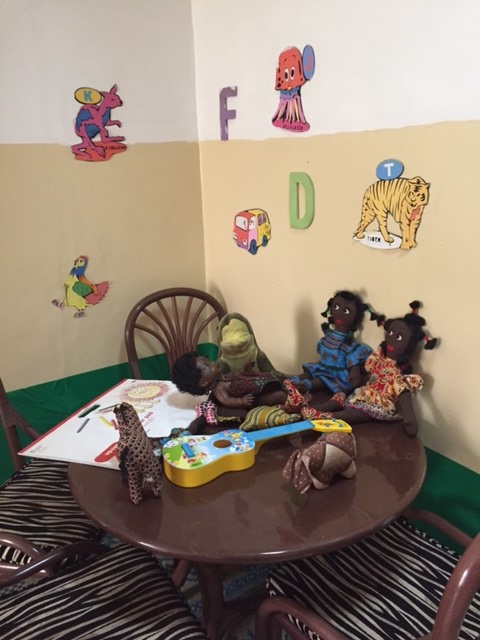July 24, 2017
This is the first in a series of blog posts exploring how challenges to gender equality affect efforts to end the epidemics of AIDS, tuberculosis (TB) and malaria. The full series will be available here.
The Global Fund Board meeting in Kigali, Rwanda, a few weeks ago was an opportunity for stakeholders from implementers, civil society, business, philanthropies, and donor governments around the world to make site visits to projects this partnership funds in Rwanda.
Five kilometers from downtown Kigali, in Gasabo District, meeting participants like myself visited the Isange One Stop Center, co-located with the Kacyiru District Hospital. The name is apt. It really is “one stop” for women and girls facing gender-based violence – providing interdisciplinary psychosocial, medical, police and legal services. It is a collaboration of the Rwandan Ministries of Gender and Family Promotion, of Health, and of Justice along with the National Police.
As the country strives to overcome the legacy of the 1994 genocide, steadily but not completely transcending its brutality with rapid economic development, gender-based violence (GBV) continues to be a persistent problem in Rwandan society. A scholarly study of BioMed Central Women’s Health found intimate partner violence against women correlating with a time of rapid social transition in Rwanda, in analyzing 2005 and 2010 demographic and health surveys. That 2015 study noted how Rwanda’s Isange One Stop Center project was scaling to 44 district hospitals to address the phenomenon.
The country with a population of 11 million – 52 percent of which is female – continues to have one of the highest incidences of gender-based and domestic violence in Africa. Up to 93 percent of the victims in recorded cases of physical and psychological abuse were women. Approximately two in five women experienced physical violence by the age of 15. UNWomen data indicate that Rwanda’s prevalence of lifetime physical and/or sexual intimate partner violence is 34 percent.
Despite shortcomings in political pluralism, the government led by Paul Kagame has formed vital, successful partnerships to confront GBV with non-government organizations, UN agencies, and importantly the Global Fund.
The Global Fund’s partnership is key because GBV is a significant driver of HIV transmission. Rwanda resembles many sub-Saharan African and Global South countries with a substantial proportion of adolescent girls and young women becoming vulnerable to HIV infection, partially due to early sexual activity, relationships between younger women and older men, and men living with HIV who have not been tested or treated. For instance, the Global Fund finances projects in South Africa related to the nexus between GBV and HIV. A profile of a Global Fund-supported rape crisis clinic in South Africa notes that women who experience intimate partner violence face a 50 percent higher risk of HIV infection. Violent sexual assault can cause physical trauma that allows easier transmission of the virus. Moreover, fear of violence can rob women of the power to protect themselves.
On the site visit near Kigali, guided by the policewoman who heads the Center, we got to see examination rooms, a therapy room for children subjected to GBV, a medical testing laboratory, and offices for women to talk with police and receive legal aid in privacy. The bustle of the general hospital right next door demonstrated how the Center would be able to address urgent medical needs of women and girls seeking assistance. Older and younger women – some with their children in tow – sat a bit anxiously for their turns to speak with police, counselors, and medical personnel.
 A savvy civil society representative of the Global Fund Board asked the Center’s chief about something which also struck me. The therapy room for children, with both male and female dolls (see photo), reflected the Center prioritizing eliciting information from traumatized minors to advance prosecutions. The policewoman insisted that Rwandan law required that prosecutorial emphasis. This demonstrates the delicate balance between care for survivors of GBV (or human trafficking in other contexts) and the propensity to press those survivors for information – the latter defining justice for the victims as it allows quick pursuit of the culprit with evidence. This problem is faced all over the world, including in Western countries like the United States.
A savvy civil society representative of the Global Fund Board asked the Center’s chief about something which also struck me. The therapy room for children, with both male and female dolls (see photo), reflected the Center prioritizing eliciting information from traumatized minors to advance prosecutions. The policewoman insisted that Rwandan law required that prosecutorial emphasis. This demonstrates the delicate balance between care for survivors of GBV (or human trafficking in other contexts) and the propensity to press those survivors for information – the latter defining justice for the victims as it allows quick pursuit of the culprit with evidence. This problem is faced all over the world, including in Western countries like the United States.
The Center is highly impressive. It integrates medical and counseling care along with elements of the justice system — not merely in theory, but practice. The Global Fund-supported project administers HIV testing and follow-on treatment, serving to mitigate the spread of HIV after GBV. This system holds perpetrators to account by deterring their actions, diminishing future GBV (and resulting HIV infections), and rightfully placing stigma on the violators rather than the violated.
As this blog series will explore, gender equality is crucial in the fight to contain and ultimately end the epidemic of HIV – as well as those of tuberculosis and malaria. It’s for this reason the Global Fund rightly prioritizes advancing female empowerment and gender equality. For women, the agency to prevent and control life-damaging pandemics begets the agency to prosper economically and exercise a voice in society and politics. The Isange One Stop Center helps make that possible for its Rwandan clients.
